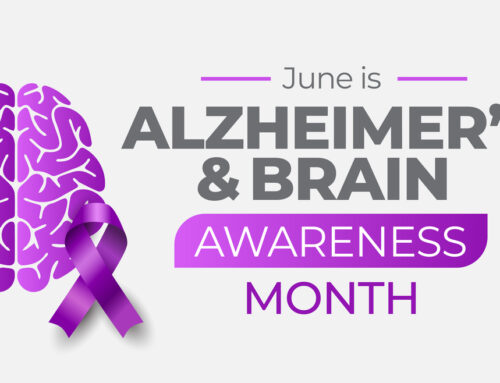Updated May 22, 2023
For those living with Alzheimer’s or watching a loved one suffer, new treatments seem painfully slow to emerge. Most medications presently available temporarily improve symptoms of memory loss, thinking, and reasoning, but they don’t stop the decline and death of brain cells. Discovering how to control that decline is akin to the holy grail in Alzheimer’s research. Although it will probably take many more years to find a cure, there is reason for optimism. As June is Brain Awareness Month, FirstLantic explores seven Alzheimer’s treatment options that are showing promise.
- Saracatinib. A drug initially developed as a possible cancer treatment is now being tested for Alzheimer’s treatment. In studies, Saracatinib turned off a protein that allowed synapses to start working again, reversing some memory loss. Phase 2 of a trial was recently completed, but no release date is scheduled beyond clinical trials.
- Tau-targeting Therapies: Tau proteins form tangles in the brains of Alzheimer’s patients, contributing to the progression of the disease. Researchers are exploring various approaches to target tau, including monoclonal antibodies, small molecules, and immunotherapies. Several tau-targeting drugs are in early clinical trials.
- Bumetanide: This generic drug is used widely to treat the swelling associated with hypertension and heart failure. However, early research showed promise that Bumetanide may also prevent the devastating brain damage of Alzheimer’s disease. Findings reported in Nature Aging show how the drug reversed signs of Alzheimer’s in mice and human brain cells in lab dishes.
- Alzheimer’s Vaccine: A nasal spray has been tested in a phase one trial using an immune modulator called Protollin to help boost immune response. Protollin, made of proteins derived from bacteria, is supposed to “activate white blood cells found in the lymph nodes on the sides and back of the neck to migrate to the brain and trigger clearance of beta-amyloid plaques. The trial is the culmination of nearly two decades of research by Dr. Howard L. Weiner, co-director of the hospital’s Ann Romney Center for Neurologic Diseases. While the phase one trial has shown promise, the researchers are not planning on filing with the FDA for another three to four years.
- Lecanemab: Lecanemab was fast-tracked for approval by the FDA to treat the underlying cause of Alzheimer’s by targeting and removing amyloid plaques in the brain. It has shown promise, but there can also be serious side effects, so patients must be monitored regularly. Another drug, Donanemab, has received the U.S. FDA’s Breakthrough Therapy designation for treating Alzheimer’s, but approval is pending further studies.
- PET Imaging: A novel imaging technique can show reactive astrocyte-neuron interactions. The method sheds new light on Alzheimer’s pathologies and offers a potential breakthrough for diagnosing and treating dementia. The discovery was made by a team of South Korean scientists at the Institute for Basic Science, and it could revolutionize the diagnosis and treatment of Alzheimer’s Disease.
- Mind-Body Connection: Evidence shows a connection between brain and heart and blood vessel health. The risk of Alzheimer’s increases when the heart or arteries are damaged by conditions such as diabetes, high blood pressure, and heart disease. Therefore, researchers are now studying whether drugs used to treat heart disease could be used to treat patients with dementia.
Summary
Almost 7 million people in the U.S. 65 and older have Alzheimer’s. So, what can be done until there is a cure for this disease? Well, there are steps we can all take to keep our brains as healthy as possible. For example, it’s believed that eating a Mediterranean diet and regular exercise can prevent or delay Alzheimer’s disease. Experts recommend 150 minutes of exercise a week. A study by the National Institute on Aging (NIA) found that healthy lifestyle behaviors create a “substantially lower risk” for Alzheimer’s. Beyond exercise and healthy eating, stimulating your brain with new challenges can also help by studying a language, taking a course, or doing a crossword daily. Music therapy can also be beneficial for those who already have dementia. Dr. Klodian Dhana, assistant professor at Rush University, who led the NIA study, said, “Those who practiced two or three of the positive lifestyle choices had a 37% lower risk, and those with four or all five had a 60% reduction in the risk of Alzheimer’s. If you do start noticing signs that could be indicative of Alzheimer’s or Dementia, then get tested right away, as the current treatments can help slow the progression.
If you or someone you know is suffering from Alzheimer’s and needs home care assistance, FirstLantic can help. We are locally owned and operated, providing our patients with the highest quality in-home care and placement services in Fort Lauderdale (Broward County) and Delray Beach (Palm Beach County) since 2000. Click here to contact us.
To read more of our blogs, click here.
 AVAILABLE 24 HOURS A DAY/7 DAYS A WEEK
AVAILABLE 24 HOURS A DAY/7 DAYS A WEEK Careers
Careers







